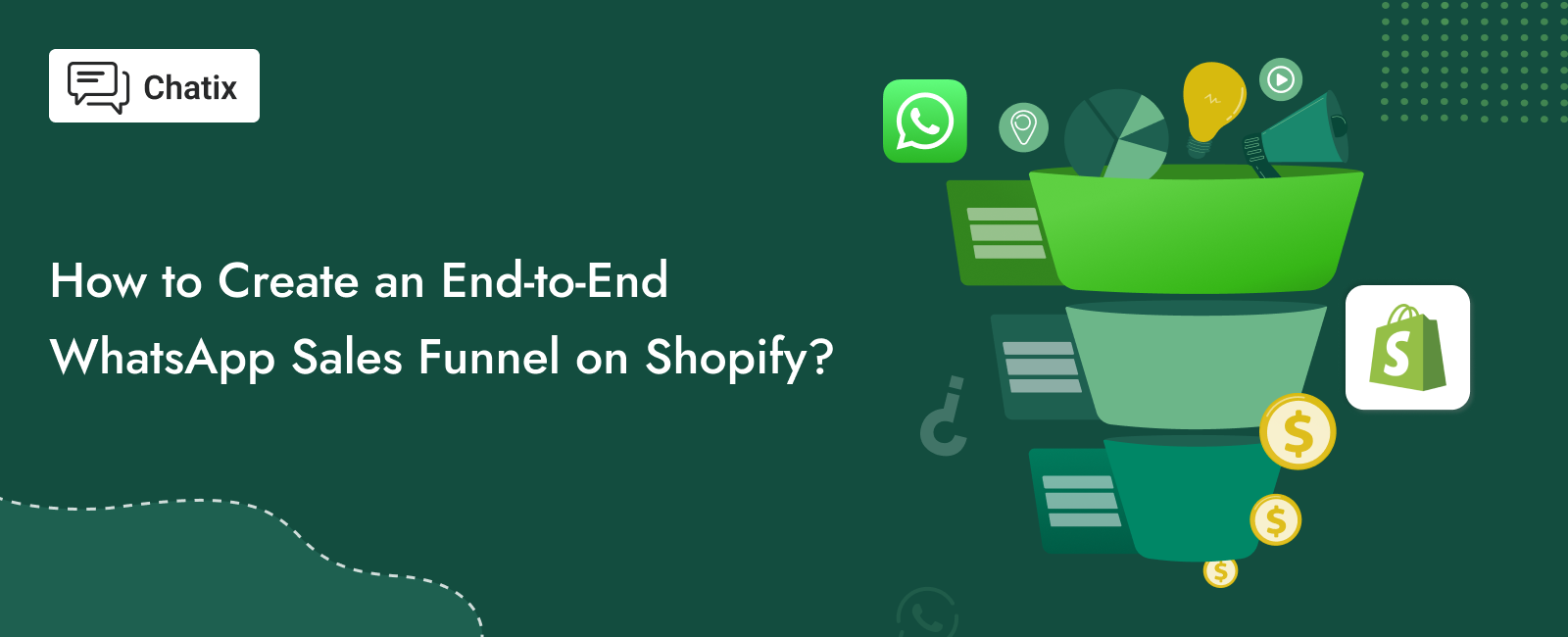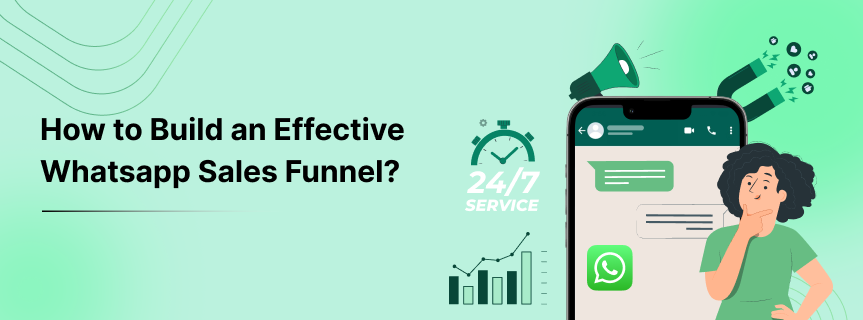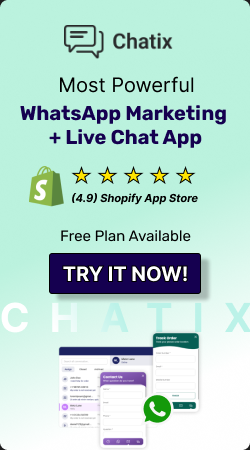
How to Build a WhatsApp Sales Funnel for Shopify in 2026?
E-commerce & Shopify Growth Published: August 18, 2025
In 2026, getting traffic to your Shopify store is not the hard part. Converting that traffic into sales is. Most stores still rely heavily on email funnels that customers open hours—or days—later. By then, buying intent is gone. Customers want faster answers, instant updates, and direct conversations.
This is where a WhatsApp sales funnel becomes one of the most powerful growth assets for Shopify merchants.
Unlike email or paid ads, WhatsApp lets you reach customers where they’re already active, responsive, and ready to act. When used strategically, it can guide shoppers from first interaction to purchase, and even bring them back again without increasing ad spend.
In this guide, we’ll break down how to build a WhatsApp sales funnel for Shopify step by step, with real use cases you can actually implement.
What Is a WhatsApp Sales Funnel?
__17555070691.png)
A WhatsApp sales funnel is a structured journey that moves customers from interest → purchase → repeat buying, using automated and real-time WhatsApp conversations.
Instead of pushing customers directly to checkout, the funnel focuses on:
- Starting conversations at the right time
- Reducing hesitation during purchase
- Staying connected after checkout
When done right, WhatsApp becomes more than a support channel—it becomes a revenue and retention engine.
Here’s why it works better than most channels:
- Messages are opened almost instantly, unlike emails that sit unread
- Conversations feel personal, not promotional
- Customers can ask questions and buy in the same thread
- Automation allows scale without losing the human touch
For DTC and small-to-mid Shopify stores, this balance of automation + personalization is exactly what’s needed in 2026. Unlike traditional funnels, WhatsApp funnels are conversational, real-time, and action-oriented, making them perfect for eCommerce buying behavior.
Related Reading: 10 Most Email Formats for Online Stores
The 4 Stages of a High-Converting WhatsApp Sales Funnel
A strong WhatsApp funnel isn’t about sending more messages—it’s about sending the right message at the right moment. Let’s break it down stage by stage.
1. Lead Capture: Turning Visitors into WhatsApp Contacts
Everything starts with how customers enter your WhatsApp funnel.
Instead of asking users to “contact us,” smart stores give customers a reason to start the chat. Common high-intent entry points include:
- Click-to-WhatsApp buttons on product pages
- Exit-intent offers that open a WhatsApp chat
- Discount messages triggered on first interaction
- Instagram and Facebook click-to-WhatsApp ads
The key is offering instant value—not generic “Subscribe” prompts. For example, offering order updates, quick support, or exclusive restock alerts works far better than plain discounts.
Most Shopify merchants use a WhatsApp chat tool like Chatix App to place these entry points without custom coding.
2. Engagement: Building Trust Before the Purchase
Once a user starts the conversation, the goal is engagement—not selling. At this stage, automated messages do the heavy lifting:
- Welcoming and greeting the user with a friendly message
- Helping them find the right product
- Answering common questions instantly
At this point, shoppers are still deciding. Fast responses matter more than promotions. Automated replies, FAQs, and quick product suggestions help reduce friction while keeping conversations natural.
Stores that respond instantly on WhatsApp often see higher conversion rates simply because they remove waiting time.
3. Conversion: Recovering Carts & Closing the Sale
This is where WhatsApp funnels outperform most channels. Cart abandonment is one of the biggest revenue leaks for Shopify stores. What matters is how fast and how personally you follow up. A strong WhatsApp funnel includes:
- Remind customers what they left behind
- Address common objections (price, delivery, returns)
- Include a direct checkout link with limited time offer
Instead of sending generic reminders, high-converting messages focus on reassurance: Shopify merchants running automated recovery flows through Chatix often combine:
- Abandoned cart messages
- Personalized product reminders
- Stock availability & Delivery timelines
- Limited-time offers when needed
Many Shopify stores automate this using WhatsApp cart recovery workflows, so no manual follow-ups are needed.
4. Post-Purchase: Turning Buyers into Repeat Customers
Most stores stop marketing after the purchase. That’s a mistake. The most profitable part of a WhatsApp sales funnel is what happens after checkout.
Post-purchase WhatsApp flows can include:
- Confirm orders and delivery updates
- Reduce “Where is my order?” tickets
- Build trust immediately after checkout
These messages build trust and keep your brand top-of-mind—without spending more on ads.
Retention-focused WhatsApp funnels often outperform acquisition because you’re selling to customers who already trust you.
Also read: How to Increase Revenue from Retention Marketing?
Now that you understand the four stages of a WhatsApp sales funnel, let’s see how to actually build and implement this funnel for a Shopify store.
How to Create an End to End WhatsApp Sales Funnel for Shopify?

1. Start Conversations at the Right Entry Points
Every WhatsApp sales funnel begins with intent capture. Your store should make it easy for visitors to start a conversation exactly when questions arise. This usually happens on product pages, the cart page, or when a visitor is about to leave.
Instead of pushing visitors to forms or FAQs, a WhatsApp chat option gives them instant access to help — which keeps them on your store longer.
Effective entry points include:
- A floating WhatsApp chat widget across the site
- Click-to-WhatsApp buttons on product and cart pages
- Pre-filled messages like “I have a question about this product”
The goal here isn’t to sell immediately, but to remove friction and open a dialogue. Visit AAMAX.
2. Engage and Qualify Customers Through Conversations
Once a conversation starts, the focus shifts to understanding intent. Some visitors are just browsing, while others are ready to buy but need reassurance. An effective WhatsApp funnel helps you quickly identify where the customer stands.
This can be done by:
- Asking simple, relevant questions
- Using quick replies for common concerns
- Tagging users based on product interest or behavior
This stage ensures your replies stay contextual and helpful, instead of generic or scripted. Customers feel guided — not marketed to.
3. Use WhatsApp to Convert High-Intent Shoppers
This is where WhatsApp becomes a revenue channel, not just a support tool. For Shopify stores, the biggest opportunity here is cart abandonment. Many shoppers abandon carts due to last-minute doubts around delivery, pricing, or returns.
A well-built WhatsApp funnel addresses this by:
- Sending timely cart recovery messages
- Mentioning the exact product left behind
- Offering assistance before discounts
When customers can reply and get instant clarification, conversions happen naturally — without aggressive follow-ups.
4. Support Checkout with Human-Led Assistance
Even at checkout, small uncertainties can stop a purchase. WhatsApp works best here as a human support layer. Instead of automated nudges, this stage focuses on reassurance.
Use WhatsApp to:
- Confirm shipping timelines or COD availability
- Answer return and exchange questions
- Share payment or order confirmation details
For first-time buyers especially, this interaction builds trust and reduces drop-offs at the final step.
5. Continue the Funnel After the Purchase
An effective WhatsApp sales funnel doesn’t end at checkout. Post-purchase communication plays a major role in customer satisfaction and retention. Order confirmations, shipping updates, and delivery notifications sent on WhatsApp keep customers informed without them needing to ask.
This stage:
- Reduces support tickets
- Builds brand reliability
- Sets the foundation for repeat purchases
Customers who feel informed are more likely to trust your store again.
6. Turn One-Time Buyers into Repeat Customers
The final stage of the funnel focuses on retention and lifetime value.
Using past purchase data, WhatsApp can be used to:
-
Send reorder reminders
Recommend complementary products
Share exclusive offers for existing customers
Because WhatsApp messages are personal and permission-based, these follow-ups feel relevant — not intrusive. Over time, this turns WhatsApp into a predictable revenue channel rather than a one-time sales tool.
7. Automate the Funnel Without Losing the Human Touch
As your store grows, automation becomes essential — but it should never feel robotic. The most effective WhatsApp funnels automate repetitive actions like cart recovery and order updates, while keeping live conversations available for high-intent customers.
Shopify-focused tools like Chatix make this easier by combining:
- WhatsApp Business API automation
- Shopify event-based triggers
- A single inbox for all conversations
This allows your funnel to scale while still feeling personal.
Why This Approach Works for Shopify Stores?
When built correctly, a WhatsApp sales funnel mirrors how customers actually shop — by asking questions, seeking reassurance, and building trust before buying.
Instead of forcing users through a rigid flow, WhatsApp lets Shopify merchants guide customers naturally from first interaction to repeat purchase. That’s what makes it one of the highest-converting channels for eCommerce in 2026.
Key Metrics to Track in a WhatsApp Funnel
To optimize your funnel, track these metrics:
- Open rate - Almost always high on WhatsApp, but worth monitoring.
- Click-through rate - See which offers drive clicks.
- Conversion rate - Track from first message to purchase.
- Response time - Faster replies usually mean higher sales.
Real-World WhatsApp Funnel Use Cases
New Product Launch
- Announce launch on WhatsApp
- Share early-access offers
- Answer product questions instantly
Abandoned Cart Recovery
- Send reminders within minutes
- Include product image and price
- Add a direct checkout link
Repeat Purchase Funnel
- Notify customers when it’s time to reorder
- Offer loyalty discounts
- Suggest complementary products
You don't need a dozen of app to increase sales. A stack of tools works best. Read our latest blog to know more about the best shopify apps to increase new product sales.
Common Mistakes to Avoid in WhatsApp Funnels
Even good funnels fail when execution goes wrong. Some mistakes to watch out for:
- Sending too many broadcasts without context
- Not segmenting buyers vs non-buyers
- Using promotional language too early
- Ignoring post-purchase communication
- Treating WhatsApp like email
A WhatsApp funnel should feel like a conversation, not a campaign blast.
How Chatix Helps You Build a WhatsApp Sales Funnel?
Running this entire funnel manually isn’t realistic for growing Shopify stores. Chatix is built specifically for Shopify stores that want to convert conversations into sales.
With Chatix, you can:
- Add WhatsApp chat to your store
- Capture WhatsApp opt-ins directly from Shopify
- Automate cart recovery and follow-ups
- Send bulk and triggered messages for offers and launches
- Manage support and sales conversations from one dashboard
Instead of stitching together multiple tools, Chatix allows merchants to run the full WhatsApp funnel from one place, keeping conversations consistent and trackable. Install CTX App and watch the difference.
Final Thoughts
A WhatsApp sales funnel is no longer optional for Shopify stores in 2026. A well-built WhatsApp sales funnel:
- Converts warm traffic more efficiently
- Improves customer experience
- Increases repeat purchases without extra ad spend
If you’re already using WhatsApp for support, you’re halfway there. Turning it into a structured sales funnel is the next logical step. Then expand as you learn what your customers respond to.
When done right, a WhatsApp sales funnel doesn’t just increase sales—it builds relationships. And in 2026, that’s what separates fast-growing Shopify brands from the rest.
Frequently Asked Questions
1. What is a WhatsApp sales funnel for Shopify?
Ans: A WhatsApp sales funnel for Shopify is a step-by-step customer journey where you use WhatsApp to capture leads, send offers, recover abandoned carts, and build long-term customer relationships
2. Why should I use WhatsApp instead of traditional sales methods?
Ans: It’s real-time, personal, and trusted — helping you connect faster and boost conversions.
3. Is WhatsApp better than email for conversions?
Ans: For time-sensitive and transactional messages, WhatsApp usually converts faster.
4. Do I need coding to set this up?
Ans: No. Most Shopify WhatsApp tools work without technical setup.

